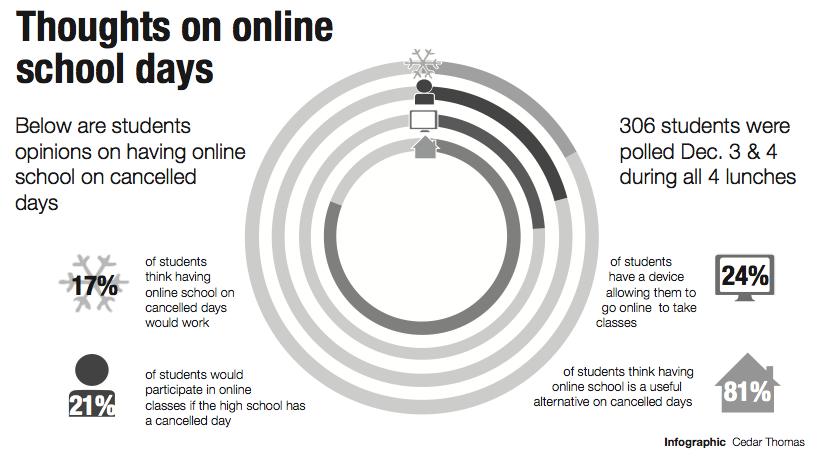Debate sparks over use of missed days
Schools across Minnesota have begun requiring students to participate in online classes on days the school is closed because of cold weather
December 18, 2014
Online lessons on cold days will prove ineffective
Technological errors outweigh potential benefits
Joe Brandel
The errors that come with online learning make the few online lessons during cancelled days unsubstantial and not worth the effort of the school.
In 2013, Columbia University’s Teacher College found varying results as to whether online learning is as beneficial as in-class lessons, in regards to grades they received.
Students learn differently with online material. For students who do not fare well with online learning, these lessons will not help them fully understand the information and could cause confusion between the student and teacher.
The format of this idea also offers room for laziness and a small chance of participation among the whole class. Students will not want to spend their day off completing online material. Because of this, it will lead to a lack of concentration and involvement in the lessons.
Internet accessibility also makes this idea difficult for some students.
According to a survey taken by 306 students, 19 percent did not have internet accessibility at home. The school should not require students who don’t have forms of internet to complete these assignments.
Lack of internet accessibility leads to a classroom in which students have different knowledge of the material. This means the class will be divided and unable to learn in the same ways.
The lack of participation, confusion and internet accessibility problems that can come up because of different types of learning among individuals, makes this method not beneficial to students and teachers alike.
Substition of days off is rewarded at the end of year
Lessons outside of school allow for productivity
Max Kent
Last year Park spent six days of school at home for cold days. It was four days of school we had to make up, and it was six days in which students experienced an interruption in their normal learning schedule.
Students can still wake up later, but they can also take time during their day off to work on online school assignments from the comfort of their home.
The idea came up this year when St. Cloud Cathedral High school implemented the policy of “virtual class day,” instead of cancelling classes. This essentially gives students and educators the chance to resume classes from home via online programs.
This was done in the Farmington School District in 2012, which supplied all of their 7,330 students and their teachers with iPad 2’s and iPad minis. Each student had to pay an annual $28 to cover an insurance fee, but the school did allow for scholarships.
As a school district almost of the same size, St. Louis Park can do the same thing as Farmington. Whether it is at home on a device, or at the library, access to the internet is easier than ever before.
Therefore, the excuses that the majority of students in the district can’t access the internet are unreasonable, and thus everyone should be able to be involved.
Instead of spending the entire day sitting around doing nothing, students could be doing light work online from their own bed, still being productive and not losing potential days of summer vacation.




